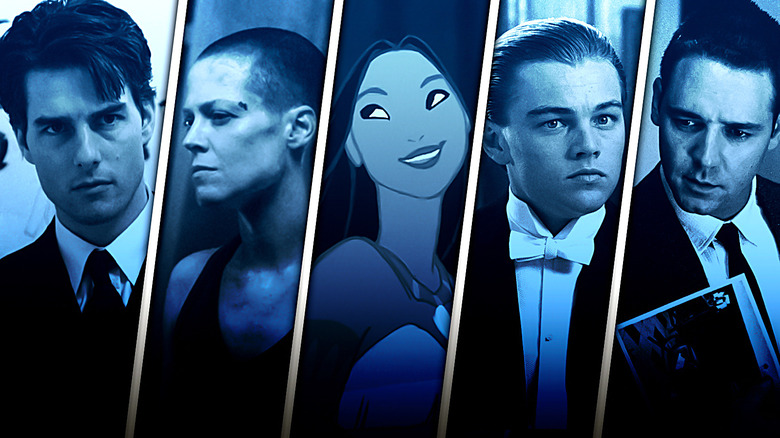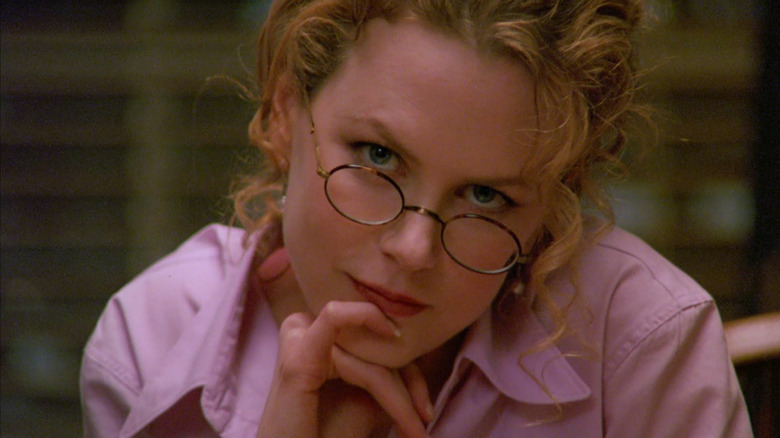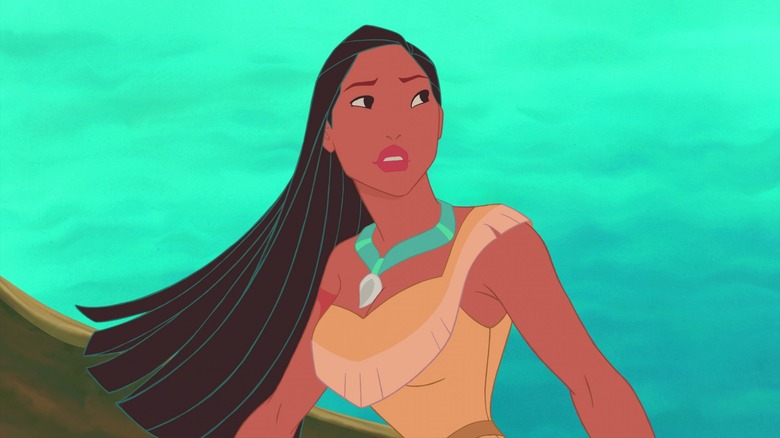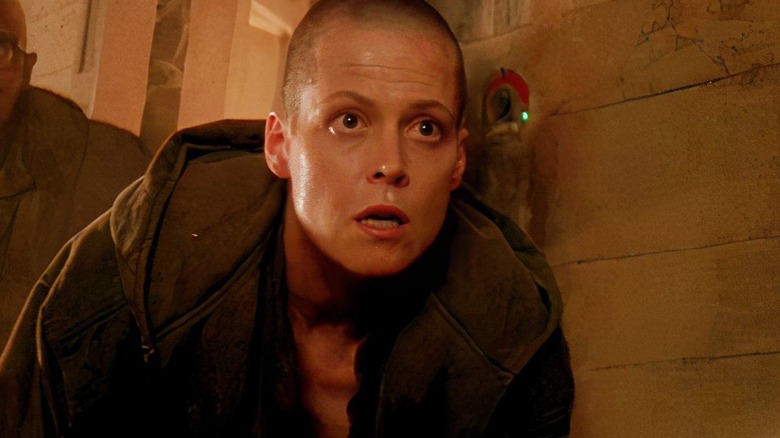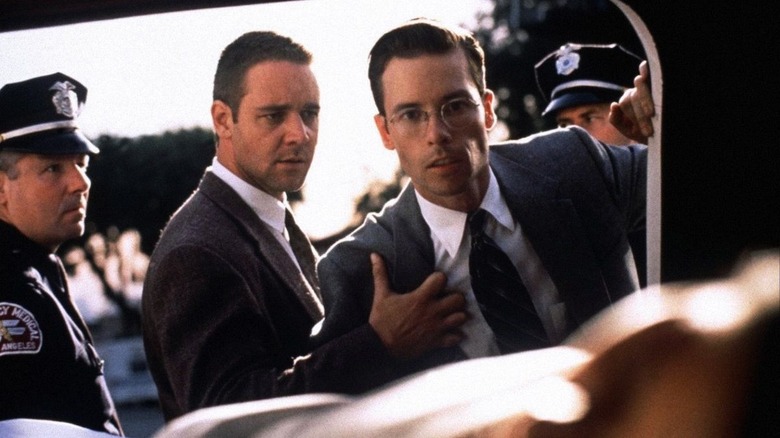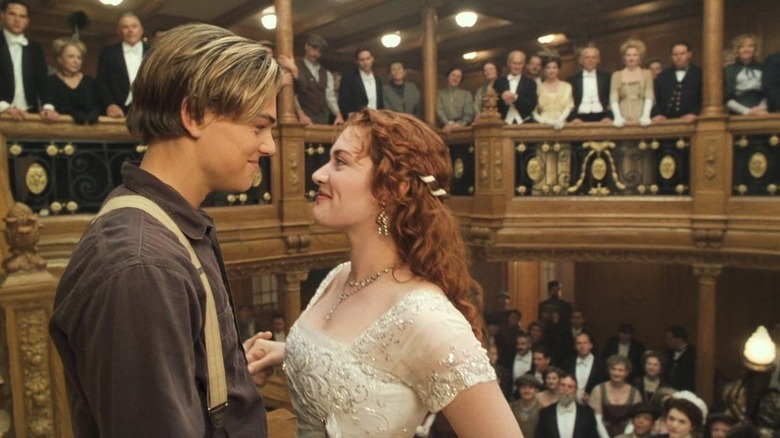5 Awful Movie Endings That Ruined Amazing Films In The 1990s
An ending can make or break a movie — everyone knows that. For every fantastic twist or satisfying ending that closes out a movie, there's a total stinker out there, and Looper has already made some pretty comprehensive lists focusing on the worst movie endings of all time. This time, we're going to focus on movies released in the 1990s, which is a pretty solid decade in terms of filmmaking ... and none of the movies listed here are bad! In fact, they're all pretty good right up until the end.
Sure, sticking the landing can be tough, but a lot of great movies from the 1990s — like "Goodfellas," "The Shawshank Redemption," and "Seven," just to name a few standout titles from the decade — manage to pull that off. These ones, however, start out with a ton of promise and either fizzle out or leave audiences completely baffled. From Stanley Kubrick's final movie to a classic Kevin Smith comedy to one of the biggest Oscar success stories of all time, here are some truly awful movie endings that left these 1990s movies in a terrible place.
Eyes Wide Shut
Stanley Kubrick's last movie came in 1999 with "Eyes Wide Shut," and the venerated director actually died shortly after he showed the movie's final cut to Warner Bros., the studio that produced it. Sadly, the ending is genuinely confusing and weird, which ends up blemishing the overall legacy of the film — and certainly, the ending doesn't hit as hard as Kubrick's other masterpieces like "The Shining" and "2001: A Space Odyssey." So where does "Eyes Wide Shut" go wrong?
Based on a novella titled "Traumnovelle (Dream Story)" by Arthur Schnitzler, "Eyes Wide Shut" casts Nicole Kidman and Tom Cruise (who were a couple in real life at the time) as Alice and Bill, a successful married couple living in New York who encounter a serious impasse in their marriage. When Alice tells Bill that she contemplated having an affair a year before the film's main narrative begins, Bill is left reeling, at which point he gets involved in a sexual, shady secret society that hosts lavish, bawdy parties where powerful people can hide their indiscretions. A lot of truly wild stuff happens from that point on, and at the end of the movie, Bill discovers a mask from one of the parties in the bed he shares with Alice, and as they recover, she ends the movie with a genuinely bizarre line, saying the couple needs to do something as quickly as possible. What's that, Bill asks? "F***," Alice responds. Then the movie's over.
Sure, it's not the worst movie ending of all time, but it's pretty tonally strange — and leaves the viewer with plenty of unsettling questions. "Eyes Wide Shut" is an engrossing film, but it doesn't have a great ending.
Pocahontas
Disney has made a ton of incredible animated movies of the years, and "Pocahontas" could have been one of them ... if it didn't flat-out rewrite history and completely change the story of a real Native figure who was taken from her homeland. The animated film, which came out in 1995, has stars Irene Bedard and Mel Gibson as the voice actors behind Pocahontas and her Enfliag enemy-turned-lover John Smith, and it seriously sanitizes what happened to the real Pocahontas. In this version of the past, John Smith and other would-be settlers in what the Englishmen call Jamestown end up falling for each other, which leads to John siding with the Natives and against his own men, who would happily destroy and steal the Native culture and land. As the two sides prepare for war against one another, Pocahontas convinces her father not to attack John, and when John's cruel governor Ratcliffe (voiced by David Ogden Stiers) shoots John, the other settlers position themselves against him.
This take on "Pocahontas" — who, again, was a real person — ends with John Smith and the other settlers peacefully returning to England; though he asks Pocahontas to join him, she says no and stays with her tribe. This is not what happened. The real Pocahontas was kidnapped when she was roughly sixteen years old, forced to marry an Englishman named John Rolfe, and taken to London before she eventually died when she was about twenty years old. This would have made for a pretty terrible Disney movie, but the ending we got was just a lie.
Alien 3
Everyone knows that Ellen Ripley is one of the best and baddest female protagonists in movie history, and everyone also knows that "Alien 3" does her dirty in the worst way. In the third "Alien" film, directed by future auteur David Fincher, Ellen's escape pod lands on Fiorina "Fury" 161, home to a maximum security prison that only houses male inmates with severe social issues. That's not the worst part, though. The worst part is that the movie kills Ellen at the very end, after two previous movies where she outwitted and outlasted even the most dangerous situations with the facehuggers.
A lot of people hated "Alien 3," including Fincher himself; in 2009, he told The Guardian, "I had to work on it for two years, got fired off it three times and I had to fight for every single thing. No one hated it more than me; to this day, no one hates it more than me." That's fair, and one has to wonder if the disappointing ending had anything to do with it.
L.A. Confidential
"L.A. Confidential," based on James Ellroy's novel of the same name, focuses on a group of police officers in Los Angeles struggling to figure out a mystery that has to do with seedy Hollywood players and crooked cops. For pretty much all of the movie, we follow Detective Lieutenant Edmund Exley (Guy Pearce), casually known as "Shotgun Ed," whose detective father was murdered ... and the culprit still walks free. From that point, Exley starts suspecting that the police captain, Dudley Smith (James Cromwell), might have something to hide, and he's eventually proven right when Smith's corrupt dealings are revealed when Exley and his allies discover that the captain set up three Black victims to take the fall for his own crimes. So is Smith brought to justice? No, he's not.
In the final moments of "L.A. Confidential," Exley and Smith face off, and even though Smith pleads for his life and says he'll lie to the rest of the force and ensure Exley gets promoted, Exley kills Smith. This seems like a victory until the other cops on the Los Angeles police force decide that, to save their reputation, they'll claim Smith died a hero's death. Even though Exley is named as a hero alongside the fallen, disgraced captain, it definitely doesn't feel satisfying to see the bad guy celebrated at the end of the film.
Titanic
"Titanic" is one of the most beloved historical epics of all time and swept the 1998 Academy Awards a year after its release, but it also has a really strange ending. Let's look at the facts here. Throughout the entire film, the incredible love story between Rose DeWitt Bukater (Kate Winslet) and Jack Dawson (Leonardo DiCaprio), which takes place as the massive ship sinks, is juxtaposed with a much-older Rose (played by Gloria Stuart) explaining the entire tale to her granddaughter and a group of deep-sea explorers searching the Titanic's ruins. At the end of the movie, it's revealed that the elderly Rose still has the massive diamond necklace known as the "Heart of the Ocean," a piece of jewelry that's been the subject of obsessive searches for years, and as everyone knows, she simply chucks it into the ocean rather than reveal she's had it the entire time.
Not only does Rose toss a priceless piece of art into the bottom of the Atlantic Ocean, but the very end of the movie reveals something pretty bleak. When Rose goes to sleep — or perhaps passes away in her sleep — she's transported to the Titanic's grand staircase, where she reunites with Jack and all of the other passengers who didn't survive the shipwreck. If this is her version of heaven, it's pretty egregious that she spends it with Jack, a guy she knew for about five minutes, and not the late father of her children that she married after she made it out of the crash alive. Between the necklace toss and Rose's utter disrespect for the man that she ultimately married, the ending of "Titanic" is actually totally bizarre. (At least it's not the alternate ending, though.)
